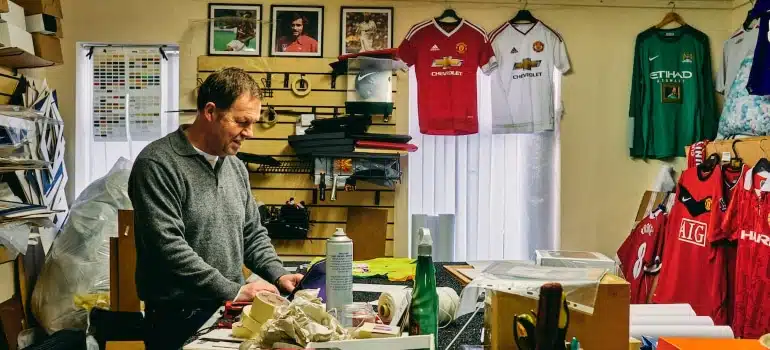Useful tricks for decluttering before moving abroad
Shipping costs rise with every extra box, so cutting down belongings matters. Sorting through furniture, clothing, and household items before packing saves money and reduces stress. Hence, practical tricks for decluttering before moving abroad can make your relocation easier and less expensive. This process also helps you start fresh in your new home. With the right steps from our reputable Miami movers, you can decide what to keep, what to sell, and how to prepare smarter.
Start with a clear plan
Decluttering before a move requires structure. Without planning, the process quickly feels overwhelming. Begin two to three months before your departure date. Break tasks into smaller steps to stay organized.
Use four categories: keep, sell, donate, recycle. Label boxes or bags to avoid confusion. Work through one room at a time instead of the entire home. A steady pace makes it easier to stay focused.
Create a weekly schedule that includes sorting, selling, and donating. For example, use weekends for larger items and evenings for online listings. Staying consistent prevents last-minute stress.
Always check shipping and airline restrictions before making decisions. Some items may be expensive or impossible to transport. With a solid plan, decluttering before moving abroad becomes manageable and less stressful.

What to get rid of when moving across country or abroad
Knowing what to get rid of when moving across country or abroad helps save money for high-end movers as well as time and effort. Furniture is often the first category to consider. Sofas, beds, and wardrobes cost more to ship than to replace. Large appliances also fit this rule.
Seasonal items may not be useful in your new location. Bulky winter gear or sports equipment might not match the climate. Electronics are another area to review. Outdated devices and duplicates only add weight.
Clothes, linens, and kitchenware also deserve attention. Keep only what you use often and donate the rest. Sentimental items need extra care. Select a few meaningful pieces and consider storage or digital copies for the rest. Focusing on value over volume makes your relocation easier and more affordable.
How to have a moving sale that works
A moving sale is one of the fastest ways to clear clutter and earn cash. Start advertising at least two weeks ahead. Use community boards, local Facebook groups, and apps like Nextdoor or Craigslist. Clear photos and fair prices attract buyers quickly.
Organize items by category on sale day. Group clothes, books, and kitchenware for easy browsing. Place larger items, such as furniture or electronics, where they catch attention. Offer discounts for bulk purchases to move things faster.
Keep prices realistic. The goal is to declutter and earn extra funds, not hold out for maximum profit. Unsold items can be donated or listed online afterward. A moving sale not only reduces what you take abroad but also gives you extra money to move.
Sell all furniture before moving
Deciding whether to sell all furniture before moving depends on your destination, budget, and shipping options. In many cases, replacing furniture abroad costs less than transporting it. Large, heavy pieces increase shipping fees and complicate logistics.
Selling makes sense when:
- Your new home is furnished.
- Shipping costs exceed replacement value.
- Furniture is bulky or outdated.
- You plan to change your interior style.
Keep only items with sentimental or high resale value, such as antiques or custom-made pieces. Everything else can be sold through online platforms, consignment stores, or your moving sale. The money you earn offsets relocation costs and clears space for essentials. Selling strategically helps you start fresh without unnecessary expenses.

How to get extra money to move
Relocation often costs more than expected, which makes earning extra funds essential. Beyond your moving sale, several strategies can provide cash quickly.
Sell clothing, electronics, and small appliances online through eBay, Poshmark, or local apps. Many people also use community markets for faster results. Another option is to take on short-term freelance work or gig jobs before leaving. These side incomes add up and help cover travel fees.
Check for unused reward points, airline miles, or store credits. Converting them into gift cards or travel discounts can reduce expenses. Tax refunds, rebates, or cash-back apps also bring in useful funds.
Combining small income sources creates a solid cushion. With these steps, you can gather extra money to move without major effort.
Donation and recycling options
Not everything will sell, but that doesn’t mean it should go to waste. Donation removal services and recycling are practical ways to clear out what remains.
Clothing, kitchenware, and furniture in good condition can go to local charities or shelters. Many organizations even offer free pickup services. This saves time and avoids disposal costs.
Recycling centers accept electronics, appliances, and scrap materials. Proper recycling prevents fines for illegal disposal and protects the environment. Some recycling programs also offer small payments for metals or electronics.
Tax deductions may apply if you itemize charitable donations. Keep receipts to claim them later. When you donate and recycle, you reduce waste, support local communities, and keep your move abroad lighter and more affordable.
Packing only what really matters
Once decluttering before moving abroad and sales, donations, and recycling are complete, focus on what truly deserves space in your luggage or shipment. Start with essentials like documents, medications, and valuables. These should always travel with you, not in cargo.
Pack clothes that suit the climate of your new country. Include versatile items you wear often instead of pieces that only take up space. For kitchenware, limit yourself to specialty tools or appliances that may be expensive to replace abroad.
Use sturdy boxes, vacuum-sealed bags, and protective wrapping for fragile belongings. Keep a detailed inventory for each box. This helps with customs, insurance claims, and staying organized after arrival.
The key is reducing bulk and packing only what adds function or comfort. If you combine this approach with white glove packing services, it will make moving abroad lighter, cheaper, and easier to manage.

Final checklist before move-out day
The final days before departure often feel hectic, but a simple checklist keeps you organized. Writing everything down reduces stress and ensures you don’t miss anything. So here’s your checklist before move-out day:
- Confirm shipping pickups and label all boxes clearly.
- Finalize donation and recycling drop-offs or pickups.
- Pack travel essentials like passports, chargers, and tickets.
- Separate valuables and important documents for safe carrying.
- Check closets, basements, garages, and drawers for overlooked items.
- Disconnect utilities and arrange final meter readings.
- Leave the home clean for the next occupants.
- Schedule junk removal for last-minute items.
Working through this list step by step keeps the process under control. Instead of rushing, you leave with confidence that nothing important has been missed.
Lighten your load and move abroad smarter
Well-planned decluttering before moving abroad saves money, reduces stress, and helps you begin fresh. Each step, from preparing a moving sale to choosing what to keep, clears away unnecessary weight. Selling furniture, donating goods, and recycling responsibly all make relocation easier and more affordable.
Packing only what matters keeps shipping costs low and life abroad simpler. And when clutter lingers at the last minute, junk removal can provide a quick solution. With these practical tricks, your move abroad becomes more organized and less overwhelming, giving you a cleaner start in your new home.
